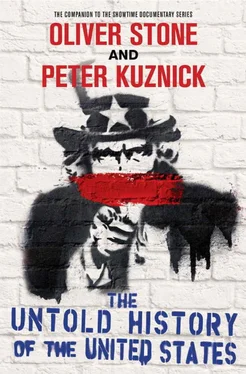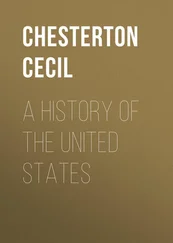Oliver Stone and Peter Kuznick
THE UNTOLD HISTORY OF THE UNITED STATES
To our children—Tara, Michael, Sean, Lexie, Sara, and Asmara—and the better world that they and all children deserve.
FOREWORD

This book and the documentary film series it is based on challenge the basic narrative of U.S. history that most Americans have been taught. That popular and somewhat mythic view, carefully filtered through the prism of American altruism, benevolence, magnanimity, exceptionalism, and devotion to liberty and justice, is introduced in early childhood, reinforced throughout primary and secondary education, and retold so often that it becomes part of the air that Americans breathe. It is consoling; it is comforting. But it only tells a small part of the story. It may convince those who don’t probe too deeply, but like the real air Americans breathe, it is ultimately harmful, noxious, polluted. It not only renders Americans incapable of understanding the way much of the rest of the world looks at the United States, it leaves them unable to act effectively to change the world for the better. For Americans, like people everywhere, are in thrall to their visions of the past, rarely realizing the extent to which their understanding of history shapes behavior in the here and now. Historical understanding defines people’s very sense of what is thinkable and achievable. As a result, many have lost the ability to imagine a world that is substantially different from and better than what exists today.
Thus, the book we have written, though inspired by and based upon the documentary film series, is in many ways independent. We see the book and documentary as complementary but not the same. We hope documentary viewers will read the book to get a fuller sense of this history and that readers will watch the documentary to get the full power of the visual and dramatic presentation. We offer both book and film series to the forces of progressive change around the world in the hopes that the information we provide will prove useful in their fight for a more just, humane, democratic, and equitable world.
INTRODUCTION:
Roots of Empire: “War Is a Racket”

We write this book as the curtain slowly draws down on the American Empire. It was 1941 when magazine magnate Henry Luce declared the twentieth century the “American Century.” Little could he have imagined how true that would be, writing before the defeat of Germany and Japan, the advent of the atomic bomb, the boom in U.S. postwar production, the rise and institutionalization of the military-industrial complex, the development of the Internet, the transmogrification of the United States into a national security state, and the country’s “victory” in the Cold War.
Luce’s vision of untrammeled U.S. hegemony has always been a contested one. Vice President Henry Wallace urged the United States to instead usher in what he called “the Century of the Common Man.” Wallace, whom realists dismissed as a “dreamer” and a “visionary,” laid out a blueprint for a world of science-and technology-based abundance, a world banning colonialism and economic exploitation, a world of peace and shared prosperity. Unfortunately, the postwar world has conformed much more closely to Luce’s imperial vision than Wallace’s progressive one. More recently, in 1997, a new generation of proponents of U.S. global supremacy, who would go on to constitute the neoconservative “brain trust” of the disastrous George W. Bush presidency, called for the establishment of a “new American Century.” It was a perspective that gained many adherents in the earlier years of the twenty-first century, before the calamitous consequences of the United States’ latest wars became widely recognized.
The United States’ run as global hegemon—the most powerful and dominant nation the world has ever seen—has been marked by proud achievements and terrible disappointments. It is the latter—the darker side of U.S. history—that we explore in the following pages. We don’t try to tell all of U.S. history. That would be an impossible task. We don’t focus extensively on many of the things the United States has done right. There are libraries full of books dedicated to that purpose and school curricula that trumpet U.S. achievements. We are more concerned with focusing a spotlight on what the United States has done wrong—the ways in which we believe the country has betrayed its mission—with the faith that there is still time to correct those errors as we move forward into the twenty-first century. We are profoundly disturbed by the direction of U.S. policy at a time when the United States was recently at war in three Muslim countries and carrying out drone attacks, best viewed as targeted assassinations, in at least six others. Why does our country have military bases in every region of the globe, totaling more than a thousand by some counts? Why does the United States spend as much money on its military as the rest of the world combined? Why does it still possess thousands of nuclear weapons, many on hair-trigger alert, even though no nation poses an imminent threat? Why is the gap between rich and poor greater in the United States than in any other developed country, and why is the United States the only advanced nation without a universal health care program?
Why do such a tiny number of people—whether the figure is currently 300 or 500 or 2,000—control more wealth than the world’s poorest 3 billion? Why are a tiny minority of wealthy Americans allowed to exert so much control over U.S. domestic politics, foreign policy, and media while the great masses see a diminution of their real power and standards of living? Why have Americans submitted to levels of surveillance, government intrusion, abuse of civil liberties, and loss of privacy that would have appalled the Founding Fathers and earlier generations? Why does the United States have a lower percentage of unionized workers than any other advanced industrial democracy? Why, in our country, are those who are driven by personal greed and narrow self-interest empowered over those who extol social values like kindness, generosity, compassion, sharing, empathy, and community building? And why has it become so hard for the great majority of Americans to imagine a different, we would say a better, future than the one defined by current policy initiatives and social values? These are only a few of the questions we will address in these pages. Although we can’t hope to answer all of them, we hope to present the historical background that will enable readers to explore these topics more deeply on their own.
Along the way, we will also highlight some of the forces and individuals who have endeavored, sometimes heroically, to put the country back on the right track. We take seriously President John Quincy Adams’s July 4, 1821, condemnation of British colonialism and declaration that the United States “goes not abroad, in search of monsters to destroy” lest she “involve herself beyond the power of extrication, in all the wars of interest and intrigue, of individual avarice, envy, and ambition, which assume the colors and usurp the standard of freedom. The fundamental maxims of her policy would insensibly change from liberty to force. ” The United States, Adams warned, might “become the dictatress of the world [but] she would be no longer the ruler of her own spirit.” 1
Читать дальше














